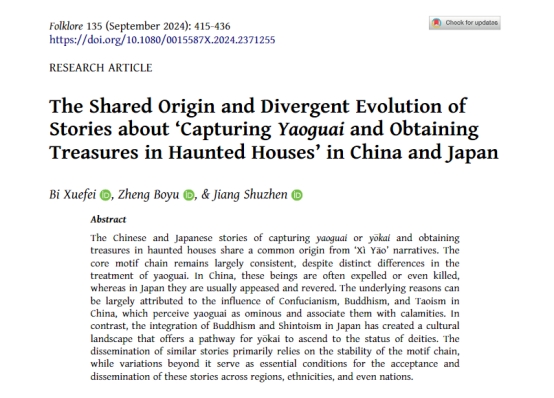我院毕雪飞教授撰写的学术论文“The Shared Origin and Divergent Evolution of Stories about ‘Capturing Yaoguai and Obtaining Treasures in Haunted Houses’ in China and Japan”在《Folklore》2024年第3期发表。
论文摘要:
The Chinese and Japanese stories of capturingyaoguaioryokaiand obtainingtreasures in haunted houses share a common origin from ‘XiYao’narratives. Thecore motif chain remains largely consistent, despite distinct differences in thetreatment of yaoguai. In China, these beings are often expelled or even killed, whereas in Japan they are usually appeased and revered. The underlying reasons canbe largely attributed to the influence of Confucianism, Buddhism, and Taoism in China, which perceive yaoguai as ominous and associate them with calamities. Incontrast, the integration of Buddhism and Shintoism in Japan has created a culturallandscape that offers a pathway for yokai to ascend to the status of deities. The dissemination of similar stories primarily relies on the stability of the motif chain,while variations beyond it serve as essential conditions for the acceptance anddissemination of these stories across regions, ethnicities, and even nations.

教师简介:毕雪飞,文学博士,浙江财经大学外语学院教授,硕士生导师。主要从事民俗学、民间文学、文化遗产等领域的研究。兼任东亚日本学学会常务理事、亚细亚民间叙事文学学会理事、中国民俗学学会理事、浙江省高等学校外国语言文学类教学指导委员会委员。主持国家社科基金、国家社科基金重大委托项目子课题、中国博士后科学基金、浙江省社科基金等多个项目,完成《浙江平湖做社》节日影像志拍摄,出版专著《日本七夕传说研究》《日本近代以来城市化进程中的年中行事传承与变迁》,合著《中国端午节·嘉兴卷》,主编学术丛书《绍兴水乡社戏》(六卷本),在《外国文学研究》《民俗研究》《民族文学研究》《民族艺术》等学术期刊上发表论文五十余篇。